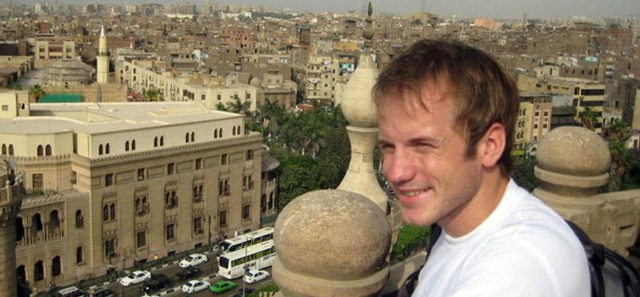
Al Jazeera's inside Man
Related Articles
Online Exclusive:
Eyewitness in Egypt
Evan Hill's dispatches from the front lines in Cairo keep the world informed on the Egyptian revolution.
Evan Hill will never forget what he witnessed on Feb. 2 when he watched at the front lines as pro- and anti-government demonstrators engaged in a medieval-style battle in Cairo’s Tahrir Square.Hill, an online producer for the Al Jazeera English website, described the “apocalyptic” scene in the story he wrote for the news agency’s website: He climbed through a gauntlet of overturned cars, rocks and metal to approach the anti-government position, watched protestors test a makeshift catapult that they used to launch flaming debris, photographed the “revolutionary armory” of rocks and petrol bombs and watched the protestors tend to their wounded comrades.
“That was probably the craziest night, when there were Molotov cocktails flying around and rocks being thrown back and forth,” Hill said. “That whole experience is something I’ll never forget for as long as I live. That was the moment when this revolution in Egypt, or whatever you want to call it, was at its most vulnerable point, and I saw the protestors win.”
For more than two weeks Hill (J07) has been chronicling the protests calling for the resignation of Egyptian President Hosni Mubarak. Since arriving in Cairo from Al Jazeera headquarters in Doha, Qatar, on Jan. 29, Hill has compiled stories about the economic effects of the protests on normal people and about civilian checkpoints set up in the wake of the initial chaos, when citizen brigades took to the streets to defend their neighborhoods.
Upcoming stories include coverage on the youth movement among the protestors, “because the youth are responsible for breaking the dam here and letting out the frustrations of the rest of the country.”
Hill says he’s proudest of the story and interview his team did with the rooftop protestors who are occupying an apartment building overlooking Tahrir Square. “We were able to sit here on the vanguard of this revolution and provide insights directly to the people, especially in the West, straight from the mouths of these revolutionaries.
“Wire agencies and major newspapers are doing a sort of birds-eye view, and they’re covering the politics,” Hill said from the festive Tahrir Square on Feb. 8 (when a huge crowd turned out after the release of Google exec Wael Ghonim, the protest’s most prominent Facebook organizer). “What I’ve found I’m naturally able to do is to cover events on the ground and make sure people aren’t losing sight of the actual protestors who started this whole thing.”
Hill managed to avoid detention and arrest when the government cracked down on the media during the second week of the protests, but he has changed his technique.
While he continues to post stories and video on the Al Jazeera website, Twitter has become a primary reporting medium. “The power of Twitter right now for me is that all it takes is this phone,” says Hill, who estimates that his Twitter following has grown from 500 in the early days of the protests to 13,500 and counting (follow Hll on Twitter). “If there’s one thing that’s not suspicious to carry around in Cairo, it’s a mobile phone. Everybody has one. And so when you have to put away your notebooks and your cameras, you can still have your phone.”
“Twitter is just another way of providing news. It’s like news bulletins. It’s pretty effective minimalist reporting, and it’s up to the minute. For this, especially with all the action in the last week, to give people that kind of information is unprecedented. And it makes me feel very effective, just being able to report with my phone, even if it’s just 140 characters.”
While Hill avoided detention, he did encounter an angry mob when he visited the Mostafa Mahmoud Mosque in the Cairo neighborhood of Mohandiseen, where a large pro-Mubarak crowd had gathered Feb. 2. He interviewed one articulate, intelligent young man in the crowd who casually mentioned to a passerby that Hill worked at Al Jazeera (the network has drawn the ire of the Egyptian government for its alleged role in riling up the protestors). “All of the sudden, within about 20 or 30 seconds, there was a crowd of about 20 or 30 people surrounding us,” Hill says. “A couple of them were really angry. Some of them were vulgar and pretty aggressive.”
A police officer quickly calmed the situation. Outside of Tahrir Square, Hill no longer mentions where he works.
Born in Evanston and raised in Madison, Wis., Hill was hired by Al Jazeera in July. Based at Al Jazeera’s headquarters in Doha, Qatar, the Web journalist posts stories online and writes original material, including regional analyses. His focus is on the Middle East, primarily Egypt. He covered the elections there in late 2010 and has visited Egypt five or six times since joining Al Jazeera.
Hill hopes interest in the Egyptian uprising will convince U.S. television viewers of the merits of the network. “Al Jazeera hasn’t expanded to the States yet, hasn’t been carried on any major cable provider,” he says. “I think that’s an absolute shame because it’s the best international news network in the world. Certainly it carries a point of view, but it’s a serious newsgathering organization.”
Despite the network’s “point of view,” Hill says he’s committed to objectivity — a quality ingrained in him at the Medill School of Journalism — even if that means ending up on the wrong side of newsroom debates. He claims that he’s maintained that objectivity in his coverage in Cairo.
“I think you have to remember something we learned at Medill, which is that journalism is a tool to afflict the powerful and comfort the afflicted,” he says. “It’s hard to advocate the overthrow of a government, but I don’t think it’s irresponsible to be sympathetic to the protestors and to tell their story because we all know that the Egyptian government, for whatever its reasons, is a repressive one, and its policies have led to these grievances sort of exploding. … This mass expression of anger is unprecedented. The story needs to be told.”



 Facebook
Facebook Twitter
Twitter Email
Email


